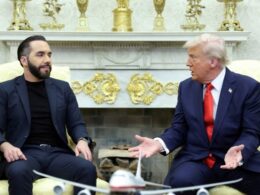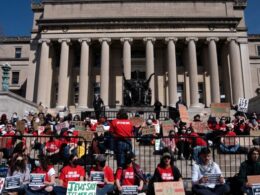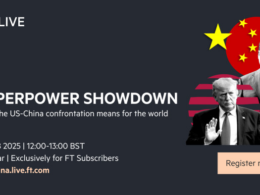One scoop to start: Donald Trump’s top economic adviser Stephen Miran struggled to reassure leading bond investors in a meeting last week that followed a bout of intense tumult on Wall Street triggered by the president’s tariffs.
Welcome to Due Diligence, your briefing on dealmaking, private equity and corporate finance. This article is an on-site version of the newsletter. Premium subscribers can sign up here to get the newsletter delivered every Tuesday to Friday. Standard subscribers can upgrade to Premium here, or explore all FT newsletters. Get in touch with us anytime: Due.Diligence@ft.com
In today’s newsletter:
A rude awakening for A&O Shearman
It was the marriage Allen & Overy had been hunting two decades for, but the honeymoon didn’t last long.
The UK law firm had established itself as one of London’s leaders, but its ambitions lay across the Atlantic. So when Shearman & Sterling — once one of Wall Street’s biggest names — approached A&O to discuss a merger, partners jumped at the opportunity.
More than 99 per cent of partners from both sides backed the plan, which for A&O, came after 20 years of merger talks with US law firms, ranging from Wilson Sonsini to Latham & Watkins.
The merger created A&O Shearman, a colossus of almost 4,000 lawyers that fused A&O’s London credentials with Shearman’s New York might.
But just a year on, the combined outfit has teething problems, reports the FT’s Suzi Ring.
Law firm mergers are difficult at the best of times, but A&O Shearman is contending with a problem that few could have anticipated: Donald Trump’s war on Big Law.
Earlier this month, the firm settled with the Trump administration over its use of diversity, equity and inclusion hiring policies. It agreed to deliver $125mn worth of pro bono services and expunge the term “DEI” from its programmes.
The firm has been forced to explain its decision-making to staff, and clients and former employees have criticised the deal on social media.
Outside of the chaos that Trump has inflicted, there are cultural challenges in wedding a US law firm to a British one.
Although A&O’s employee count dwarfs that of Shearman, some among the firm’s UK staff complain of a creeping Americanisation.
They point to a recent “reminder” sent to the London office that bonuses might be cut for failure to comply with the three-day-a-week office policy.
Nonetheless, the firm has staved off an exodus of star partners — crucial in an industry that depends upon rainmakers and their personal connections to bring in the cash. (The notable exception is George Casey, who left for Linklaters last year.)
The firm has launched a new all-equity compensation plan to retain US talent, with pay pitched just below the highest-paying firms. Top-performing partners will be able to earn more than $10mn.
In securing a transatlantic deal, A&O Shearman has achieved a rare feat. It has 47 offices in 28 countries and has abandoned the concept of a headquarters in any one geographic location.
But the first real test of whether the marriage has succeeded will come in the summer, when the firm reports its combined annual results.
KKR says Europe enjoying ‘renaissance’
For a long time in the investing world, Europe was the US’s underachieving little sibling. The US appeared to have discovered how to supercharge the performance of its stocks and economic growth, while Europe lagged behind.
But sentiment appears to be changing. Not just because of Donald Trump’s dramatic recent tariff announcements and ensuing indecision, but because of proactive moves that Europe’s leaders are making themselves.
The European co-head of US private capital behemoth KKR told DD’s Alexandra Heal that the continent now appeared to be demonstrating “a real focus on self-reliance and reshaping of the economic model”, citing Germany’s recent announcement of €500bn in public spending on infrastructure.
“As a consequence of things like the Draghi report [on competitiveness] and tariffs, Europe’s undergoing a bit of a renaissance,” said Tara Davies, referring to Mario Draghi, the former European Central Bank president. Davies also co-heads the group’s infrastructure activities in the continent.
Her European co-head, Mattia Caprioli, was particularly excited about changes Draghi recommended. “We’re very excited and very positive about the outlook for Europe, probably more so now than to some extent before,” he said.
“Rather than having five, six, seven different public markets in Europe that are small and fragmented and cannot provide enough liquidity to a business, you have one larger one with one simple legal system,” he said, referring to Draghi’s recommendation for unifying Europe’s capital markets. “It would make it easier for certain companies to find capital.”
He cautioned the firm would still be investing significantly in the US, despite uncertainty, because “we don’t wake up one day and say, now Europe is more attractive than this other area”. KKR was more interested in the underlying drivers of businesses, he said.
In addition to finding new market opportunities, KKR is opening itself to new pools of capital after striking a wide-ranging exclusive partnership with asset management group Capital Group.
The tie-up shows asset managers and private capital groups can see their worlds converge without a wave of M&A.
Italy’s complex bank M&A race
For any bankers mulling a move from London to Milan, there’s an interesting M&A market shaping up in Italy right now.
The country’s biggest banks have busied themselves in interconnected takeover battles that boggle the mind. UniCredit chief executive Andrea Orcel has also bolstered the ambitions of the region’s once-downtrodden lenders with his M&A power plays.
On Monday, Mediobanca launched the latest salvo: a €6.3bn takeover offer for rival Banca Generali.
Mediobanca looks like it’s trying to kill two birds with one stone.
The bank has faced criticism for its over-reliance on insurance group Assicurazioni Generali, in which it is the biggest shareholder. A takeover of Banca Generali would expand its breadth, growing its foothold in wealth management.
Separately, Mediobanca has been fighting off a hostile bid.
In a move that shocked investors, rival Monte dei Paschi di Siena in January submitted a €13.3bn all-share bid for Mediobanca, despite being about two-thirds of its size. In the wacky world of Italian banking, the little fish was trying to eat the big fish.
But by ingesting Banca Generali, Mediobanca could fatten itself up and shield itself from an MPS takeover.
Beneath all this is a messy and complex game of chess between Italy’s financiers and Giorgia Meloni’s government, which wants a “third pole” to counterbalance the sprawling banking empires of UniCredit and Intesa Sanpaolo.
For outside observers though, the real prize is control of Assicurazioni Generali, Italy’s largest insurer.
To fund its direct purchase of Banca Generali, Mediobanca says it will offload its 13 per cent stake in the insurance group (which is Banca Generali’s parent company).
Insurers have always been prized for their consistent cash returns. But in Italy, warring banks make them even more appetising for investors.
Go deeper with Lex.
Job moves
-
KKR senior advisory partner Johannes Huth will remain on the supervisory board of Axel Springer after the media company and the US private equity group closed a deal to split the company. Huth is also set to become managing director at Groupe Bruxelles Lambert.
-
Prosus has appointed Nico Marais as its chief financial officer. Marais has served as finance chief on an interim basis since December and was previously general manager of finance.
-
Law firm Clifford Chance has appointed 31 new partners, including Michael Van Arsdall, counsel in the firm’s antitrust group in Washington DC.
-
Ladbrokes owner Entain has named Stella David as its permanent chief executive. She previously chaired the company’s board, before her appointment as interim chief executive in February.
Smart reads
Apollo’s relief Private equity firms bought up German banks in the wake of the financial crisis, but have struggled to sell them, the FT reports. Now, Apollo has managed an exit.
Behind the scenes Margin Call has endured as one of the smartest vignettes of the global financial crisis. Semafor spoke to the movie’s director to understand how an obscure filmmaker so brilliantly captured the moment.
Bravo, Orlando! King of SaaS Orlando Bravo cuts a dashing figure in a glittering profile for Bloomberg. Coincidentally, the Thoma Bravo co-founder recently leapfrogged longtime Vista Equity rival Robert Smith in the latest update to Bloomberg’s Billionaires Index.
News round-up
White House lashes out at ‘hostile and political act by Amazon’ (FT)
Donald Trump softens car tariffs as he visits industrial heartland in Michigan (FT)
KKR and Capital Group seek to lure investors to private markets with new funds (FT)
Pirelli strips China’s Sinochem of control in attempt to avert exclusion by Trump in US (FT)
Wall Street banks predict GDP contraction after US trade deficit hits record (FT)
Malta’s ‘golden passport’ scheme breaks law, EU’s top court rules (FT)
ECB staff say bank promotes wrong people, survey finds (FT)
Due Diligence is written by Arash Massoudi, Ivan Levingston, Ortenca Aliaj, Alexandra Heal and Robert Smith in London, James Fontanella-Khan, Sujeet Indap, Eric Platt, Antoine Gara, Amelia Pollard, Maria Heeter, Kaye Wiggins, Oliver Barnes and Jamie John in New York, George Hammond and Tabby Kinder in San Francisco. Please send feedback to due.diligence@ft.com
Recommended newsletters for you
Source link









